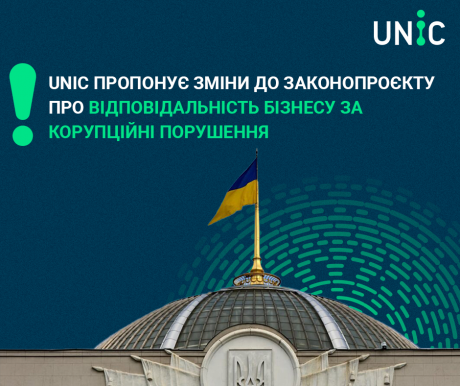UNIC proposes amendments to the draft law on business liability for corruption offenses

The All-Ukrainian Network of Integrity and Compliance (UNIC) has proposed several amendments to draft law No. 11443, aimed at strengthening the liability of legal entities for corruption offenses involving foreign officials. These amendments have been submitted to the Verkhovna Rada of Ukraine’s Committee on Law Enforcement Activities for consideration in the second reading of the draft law
UNIC supports the key provisions of the draft law but emphasizes the need for additional changes to ensure effective measures against both foreign and domestic corruption.
Context and UNIC's Position
In 2022, Ukraine began the process of joining the Organisation for Economic Co-operation and Development (OECD), which requires the ratification of the Anti-Bribery Convention. The adoption of Draft Law No. 11443 is a significant step in this direction; however, the current version primarily focuses on combating corruption abroad. UNIC experts argue that the law should also address domestic corruption and consider the needs of Ukrainian businesses.
"UNIC experts and participating companies believe that the draft law should motivate businesses to improve, not just fear fines. It’s essential for companies to face not only sanctions but also receive incentives to implement compliance obligations and anti-corruption measures with state support," emphasized UNIC Secretariat Head Antonina Prudko.
Key Proposals:
- Extending liability to domestic corruption: The current draft focuses primarily on foreign offenses, creating an imbalance in the fight against corruption. UNIC recommends including domestic offenses to establish a unified, comprehensive approach.
- Addressing commercial corruption: UNIC advocates for the application of anti-corruption standards to both public and private sectors, closing potential enforcement gaps.
- Balancing non-financial sanctions: To avoid disproportionate economic consequences, UNIC proposes refining non-financial sanctions, such as license restrictions, ensuring they align with specific violations.
- Limiting prosecutorial discretion: UNIC recommends clear criteria for prosecutorial actions to prevent selective enforcement.
- Restricting enforcement measures: Preventive measures against companies should be minimized to avoid undue harm to businesses and the economy.
- Incentives for corrective actions: UNIC supports mitigating sanctions for companies that proactively address violations, promoting compliance with anti-corruption standards.
UNIC reaffirms its readiness to collaborate with the Verkhovna Rada Committee to enhance the draft law, expressing hope that these amendments will strengthen the fight against corruption, boost business transparency, and align with OECD standards.




